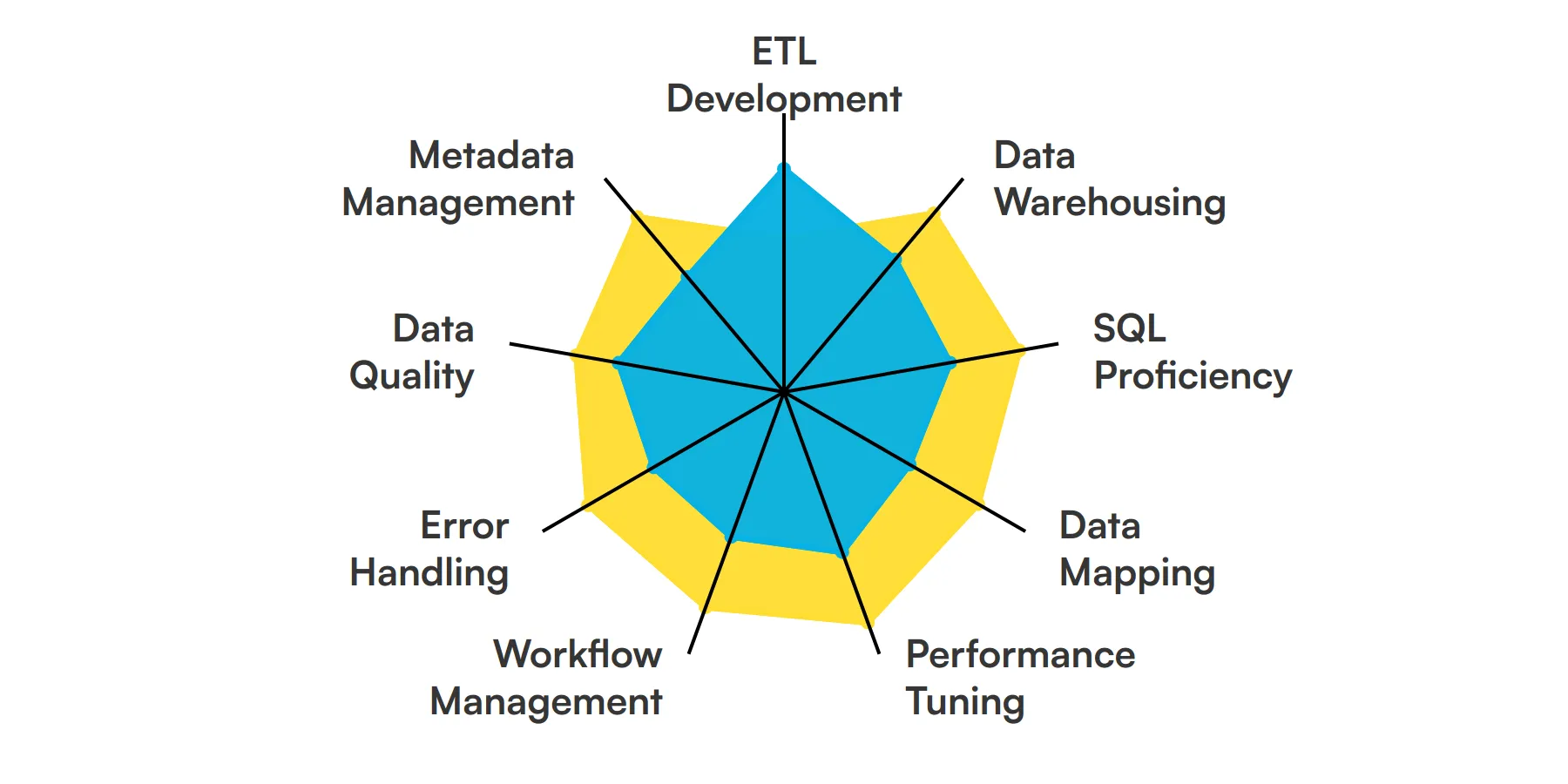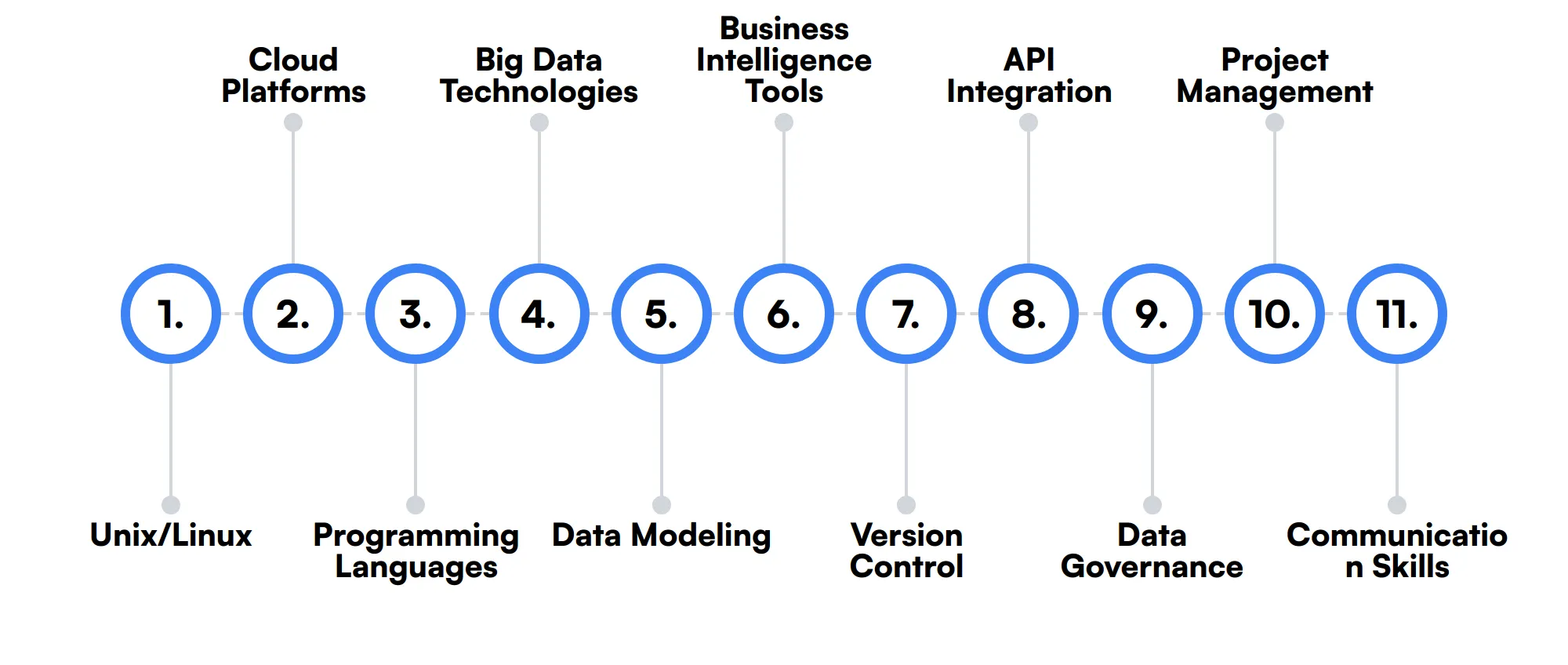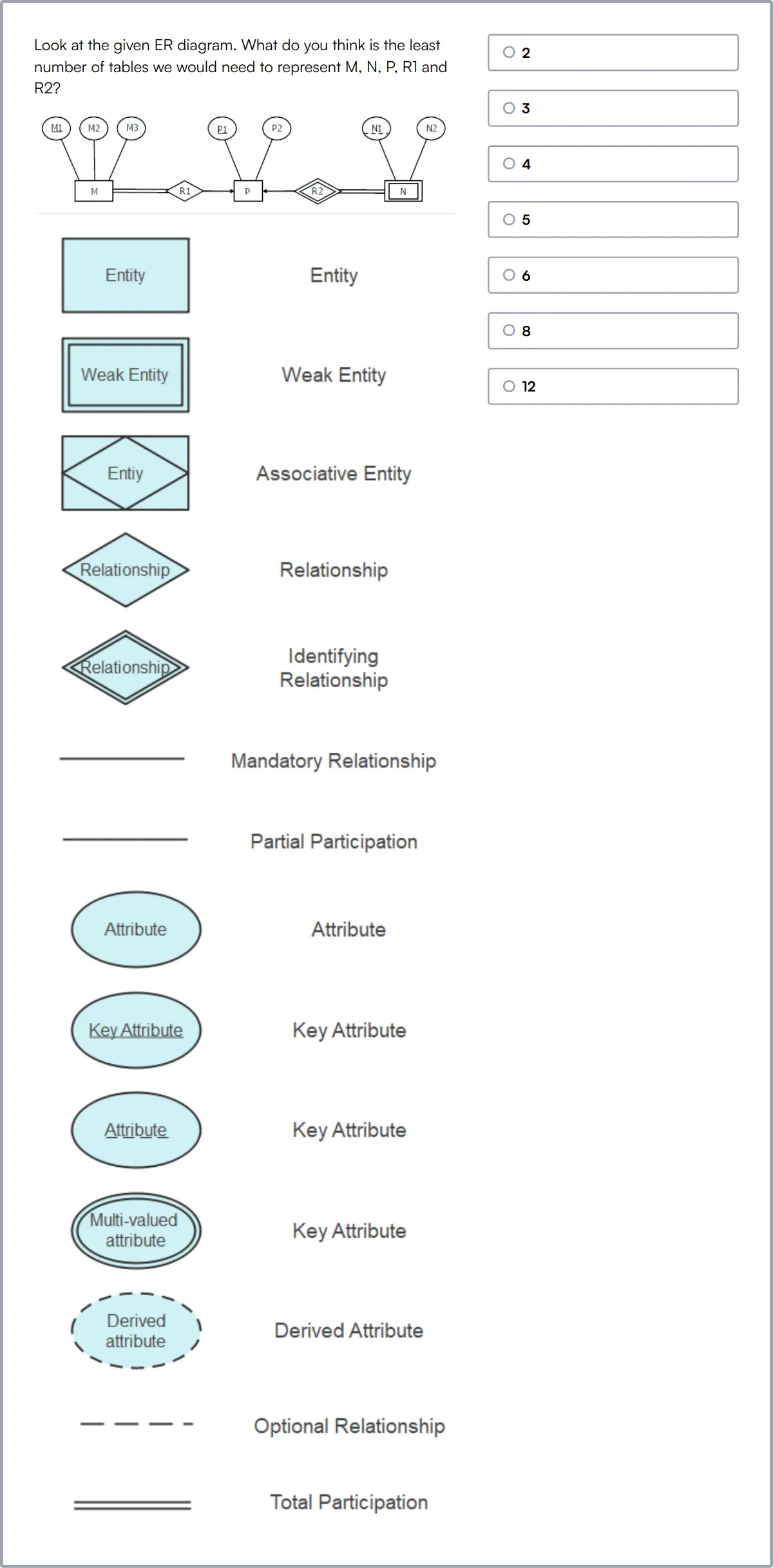Informatica developers are at the heart of data management solutions, ensuring seamless data integration and transformation across platforms.
Skills required for this role include proficiency in Informatica tools, understanding of SQL and databases, as well as strong analytical and problem-solving abilities.
Candidates can write these abilities in their resumes, but you can’t verify them without on-the-job Informatica Developer skill tests.
In this post, we will explore 9 essential Informatica Developer skills, 11 secondary skills and how to assess them so you can make informed hiring decisions.
Table of contents
9 fundamental Informatica Developer skills and traits
The best skills for Informatica Developers include ETL Development, Data Warehousing, SQL Proficiency, Data Mapping, Performance Tuning, Workflow Management, Error Handling, Data Quality and Metadata Management.
Let’s dive into the details by examining the 9 essential skills of a Informatica Developer.

ETL Development
ETL (Extract, Transform, Load) development is at the heart of an Informatica Developer's role. This skill involves designing and implementing data extraction from various sources, transforming the data into a suitable format, and loading it into target systems. Mastery in ETL ensures seamless data integration and accurate data flow across systems.
For more insights, check out our guide to writing a ETL Developer Job Description.
Data Warehousing
Data warehousing involves the creation and management of large-scale data storage solutions. An Informatica Developer uses this skill to design and maintain data warehouses that support business intelligence activities. This ensures that data is organized, accessible, and ready for analysis.
SQL Proficiency
SQL (Structured Query Language) is essential for querying and manipulating databases. Informatica Developers use SQL to write complex queries, optimize database performance, and ensure data integrity. Proficiency in SQL is crucial for effective data management and retrieval.
Check out our guide for a comprehensive list of interview questions.
Data Mapping
Data mapping involves defining how data fields from one source correspond to data fields in a target system. Informatica Developers use this skill to ensure accurate data transformation and integration. Proper data mapping is key to maintaining data consistency and quality.
Performance Tuning
Performance tuning is about optimizing the performance of ETL processes and data workflows. Informatica Developers use this skill to identify bottlenecks, improve processing times, and ensure efficient data handling. This is critical for maintaining high-performance data systems.
Workflow Management
Workflow management involves designing, scheduling, and monitoring ETL workflows. Informatica Developers use this skill to automate data processes, ensuring timely and accurate data integration. Effective workflow management enhances operational efficiency.
Error Handling
Error handling is the process of identifying, logging, and resolving errors in data workflows. Informatica Developers use this skill to ensure data accuracy and reliability. Robust error handling mechanisms are essential for maintaining data integrity.
Data Quality
Data quality involves ensuring that data is accurate, complete, and consistent. Informatica Developers use this skill to implement data validation and cleansing processes. High data quality is crucial for reliable business intelligence and decision-making.
For more insights, check out our guide to writing a Data Coordinator Job Description.
Metadata Management
Metadata management involves handling data about data, such as data definitions, relationships, and lineage. Informatica Developers use this skill to ensure transparency and traceability in data processes. Effective metadata management supports data governance and compliance.
11 secondary Informatica Developer skills and traits
The best skills for Informatica Developers include Unix/Linux, Cloud Platforms, Programming Languages, Big Data Technologies, Data Modeling, Business Intelligence Tools, Version Control, API Integration, Data Governance, Project Management and Communication Skills.
Let’s dive into the details by examining the 11 secondary skills of a Informatica Developer.

Unix/Linux
Knowledge of Unix/Linux is beneficial for Informatica Developers as many ETL processes run on these operating systems. Familiarity with shell scripting can help automate tasks and manage data workflows more efficiently.
Cloud Platforms
Understanding cloud platforms like AWS, Azure, or Google Cloud is increasingly important. Informatica Developers may need to integrate data across on-premises and cloud environments, leveraging cloud services for scalable data solutions.
Programming Languages
Proficiency in programming languages such as Java or Python can be advantageous. Informatica Developers might use these languages for custom transformations, scripting, or extending the capabilities of ETL tools.
Big Data Technologies
Familiarity with big data technologies like Hadoop, Spark, or Kafka can be useful. Informatica Developers may work with large datasets and need to integrate or process data using these technologies.
Data Modeling
Data modeling involves designing data structures and relationships. Informatica Developers use this skill to create logical and physical data models that support efficient data storage and retrieval.
Business Intelligence Tools
Knowledge of business intelligence tools like Tableau, Power BI, or QlikView can be beneficial. Informatica Developers may need to integrate ETL processes with BI tools to support data visualization and reporting.
Version Control
Version control systems like Git help manage changes to code and configurations. Informatica Developers use version control to track modifications, collaborate with team members, and maintain code integrity.
API Integration
API integration involves connecting different software systems using APIs. Informatica Developers may need to integrate data from various applications, ensuring seamless data flow and interoperability.
Data Governance
Data governance involves managing data availability, usability, integrity, and security. Informatica Developers use this skill to ensure compliance with data policies and regulations, supporting overall data management strategies.
Project Management
Basic project management skills can help Informatica Developers plan, execute, and monitor ETL projects. Understanding project management principles ensures that data integration projects are completed on time and within scope.
Communication Skills
Effective communication skills are important for collaborating with stakeholders, understanding requirements, and providing updates. Informatica Developers need to convey technical information clearly to both technical and non-technical audiences.
How to assess Informatica Developer skills and traits
Assessing the skills and traits of an Informatica Developer can be a challenging task, given the wide range of expertise required. From ETL Development and Data Warehousing to SQL Proficiency and Data Mapping, the skill set is diverse and specialized. It's not just about knowing the tools; it's about how effectively a developer can use them to solve real-world problems.
Traditional resumes and certifications can give you a glimpse of a candidate's background, but they often fall short in revealing true proficiency and practical know-how. This is where skills-based assessments come into play. By leveraging targeted assessments, you can get a clearer picture of a candidate's capabilities in areas like Performance Tuning, Workflow Management, and Error Handling.
For a more streamlined and effective hiring process, consider using Adaface on-the-job skill tests. These assessments can help you achieve a 2x improved quality of hires and an 85% reduction in screening time. With Adaface, you can tailor your assessments to focus on key skills such as Data Quality, Metadata Management, and more, ensuring you find the best fit for your team.
Let’s look at how to assess Informatica Developer skills with these 5 talent assessments.
Informatica Online Test
Informatica Online Test evaluates a candidate's proficiency in using PowerCenter for ETL tasks, focusing on data synchronization, replication, and transformation management.
The test assesses skills in designing data transformations, managing source and target definitions, and data wrangling using various transformation logic such as filter, join, and aggregate without the need for SQL.
Candidates who perform well demonstrate their ability to handle complex ETL processes and optimize data flow between systems effectively.
Data Warehouse Online Test
Data Warehouse Online Test measures a candidate's expertise in designing, building, and maintaining data warehouses and databases.
This test evaluates the candidate's ability to work with SQL queries, subqueries, joins, and their understanding of ETL fundamentals, data modeling, and warehousing principles.
High-scoring individuals are likely to excel in managing and structuring large datasets effectively, ensuring data integrity and accessibility.

SQL Online Test
SQL Online Test focuses on a candidate's ability to design and manage relational databases, emphasizing CRUD operations, efficient query writing, and database optimization.
The test challenges candidates to create and manipulate databases and tables, implement joins and subqueries, and optimize database performance through indexing.
Successful candidates will show a strong command of SQL, enabling them to develop and maintain efficient, scalable databases.
Data Modeling Skills Test
Data Modeling Skills Test assesses a candidate's capability in database design and data integrity using SQL, ER diagrams, and normalization techniques.
It evaluates knowledge in creating relational schemas, data mapping, validation, and transformation, ensuring candidates can design databases that effectively support business processes.
Candidates excelling in this test are likely to be proficient in structuring and managing data to support complex data-driven applications.

Informatica Data Quality Online Test
Informatica Data Quality Online Test evaluates a candidate's skills in data quality management, focusing on profiling, cleansing, and standardization.
The test covers various aspects of data quality including data masking, data validation, duplicate detection, and data enrichment, assessing the candidate's ability to maintain high data standards.
Proficient candidates will demonstrate their capability to implement comprehensive data quality strategies that enhance data reliability and usefulness for business insights.
Summary: The 9 key Informatica Developer skills and how to test for them
| Informatica Developer skill | How to assess them |
|---|---|
| 1. ETL Development | Evaluate candidate's ability to extract, transform, and load data. |
| 2. Data Warehousing | Assess understanding of data storage, retrieval, and management techniques. |
| 3. SQL Proficiency | Test candidate's skills in writing and optimizing SQL queries. |
| 4. Data Mapping | Review ability to link data between systems effectively. |
| 5. Performance Tuning | Check for skills in optimizing database and application performance. |
| 6. Workflow Management | Determine how well a candidate organizes and manages tasks. |
| 7. Error Handling | Observe strategies for identifying and resolving data processing errors. |
| 8. Data Quality | Assess methods used to ensure accuracy and reliability of data. |
| 9. Metadata Management | Evaluate handling and organization of data descriptions. |
Informatica Data Quality Online Test
Informatica Developer skills FAQs
What are the key skills required for an Informatica Developer?
Key skills include ETL Development, Data Warehousing, SQL Proficiency, Data Mapping, Performance Tuning, and Workflow Management.
How can recruiters assess ETL Development skills in candidates?
Recruiters can assess ETL Development skills by reviewing past projects, conducting technical interviews, and giving practical tests involving ETL tasks.
Why is SQL Proficiency important for an Informatica Developer?
SQL Proficiency is important because it enables developers to query, manipulate, and manage data within databases, which is essential for ETL processes.
What methods can be used to evaluate a candidate's Data Warehousing knowledge?
Evaluate Data Warehousing knowledge through scenario-based questions, reviewing past experience, and practical tests on data warehousing concepts.
How do you test a candidate's ability in Performance Tuning?
Test Performance Tuning skills by asking candidates to optimize a given ETL process or by discussing their experience with performance issues and solutions.
What is the significance of Data Quality in Informatica Development?
Data Quality ensures that the data being processed is accurate, consistent, and reliable, which is critical for making informed business decisions.
How can Unix/Linux skills benefit an Informatica Developer?
Unix/Linux skills are beneficial for managing and automating ETL processes, as many Informatica environments run on these operating systems.
What role do Cloud Platforms play in Informatica Development?
Cloud Platforms provide scalable and flexible environments for data integration, storage, and processing, which are increasingly used in modern ETL workflows.

40 min skill tests.
No trick questions.
Accurate shortlisting.
We make it easy for you to find the best candidates in your pipeline with a 40 min skills test.
Try for freeRelated posts
Free resources



